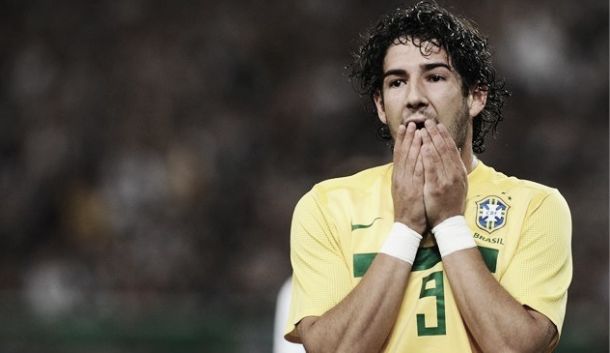It is probably fair to say that, in a reasonably strong Brazil squad, the frontman is their main area of weakness at this year's World Cup. Luiz Felipe Scolari left himself with only Fred and Jô as out-and-out strikers, and with respect to both, they aren't exactly forwards to set pulses racing among Brazil fans who have grown up watching Ronaldo, Romário or, for the lucky few, Pelé. The goalscoring burden has been placed almost totally on the shoulders of Neymar but, just a few years ago, La Seleção had a host of exciting young strikers fighting for their chance to represent their nation. The question is, what happened to them? And who will be the next youngster to come and replace them?
Perhaps the most well-known starlet to have lost his way in recent years has been Alexandre Pato, the former AC Milan forward tipped by many to become one of the best players in the world. He made his Brazil debut at the age of just 18, breaking Pelé's own record for the fastest debut goal for Brazil, but it was not an entirely new experience for the man they called 'the Duck', having scored on his Serie A debut against Napoli just two months earlier. He scored more than 50 goals for the Rossoneri during his time at the club, including one particularly memorable strike after just 24 seconds against Barcelona in the Champions League, inline through a flat-footed defence and finishing under the keeper with consummate ease at the Camp Nou. However, like many young forwards of his ilk, his career has been plagued with injuries.
Playing with such regularity at such intensity as he did with Milan from 18 years old always carries such risks, and muscle injuries have followed him everywhere he has gone, robbing him of his once astonishing pace. Doctors inside the San Siro have said that a growth spurt of around eight centimetres during his Milan years caused an excess of strain on his young muscles, and he missed a host of important occasions for his club. According to goal.com, Pato missed as many as 41.4% of his possible matches in Italy over a four-year period from 2008-12, and in the end it led to the end of his career in Europe. Though frequent rumours of a move to Arsenal dominated internet forums and tabloid newspapers, the man once valued at more than £40million by many returned to Brazil, joining Corinthians for a fee of little more than £12million.
The move has not worked out, with fans' protests to the club over poor team performances focused largely on Pato, having done little to live up to the considerable fanfare - and relatively hefty price tag - which greeted his return to Brazil. He was then involved in a controversial loan-swap deal with rivals São Paulo for attacking midfielder Jadson - a player who had become equally unpopular at his parent club - but it was not a move greeted with any enthusiasm by his new supporters, who held banners with sentiments such as "we don't want Pato here" on his debut. He has scored a couple of goals for his new side, but their was no great clamour to have him included in this year's World Cup squad. Pato's story is very much one of what could have been, rather than what is still likely to be.
Another young forward who failed to live up to the expectations placed upon him was Keirrison, still contracted to Barcelona despite having been out on loan almost constantly since 2009. Signing a five year contract with a €14million price tag in 2009, there was a keen interest surrounding a teenager who had scored at a rate of more than a goal every other game for former clubs Coritiba and Palmeiras, becoming the youngest ever top-scorer in Brazil's top division with 23 goals in 2008. However, having left Barcelona for Benfica just six days after joining Los Blaugranas, he was essentially frozen out of the side by a manager unwilling to start an unproven loanee ahead of established forwards Javier Saviola and Óscar Cardozo; he was signed before manager Jorge Jesus took the reigns at the Portuguese club.
The sad truth of the matter is that little of the misfortune which befell him was his own fault, with much of the blame easily accorded to former Barça president Joan Laporta, who sanctioned his transfer along with several other expensive failures - Dmytro Chygrynskiy and Martín Cáceres to name just two - without ever having the intention of Keirrison becoming a Barcelona first-teamer. Laporta hoped that Keirrison would go out on loan for a couple of seasons, score goals and be sold on at a huge profit afterwards, something that has gone less than swimmingly at clubs such as Doncaster. He has also had his fair share of knee injuries, which, mixed with his journeyman-like career, have hampered his development as a player. He will leave Barcelona at the end of his contract this year, and is likely to sign permanently for Coritiba, where he is currently on loan.
Our final former Brazilian wunderkind is another current loanee, Dentinho, currently partway through an unhappy spell at Beşiktaş from parent club Shakhtar Donetsk, where many Brazilians such as Bernard and Douglas Costa have made their home. He joined from Corinthians for around €7.5million in 2011 having enjoyed a blistering start to his career in Brazil. He was a member of the Corinthians squad which was infamously relegated in 2007, but came back stronger to lead the historic club's goalscoring tally in the second division the following season. Eleven goals in fourteen games for the Brazil u-20 side in 2009 made him hot property in his home country, but he soon found himself going down a well-trodden path. His early pace, dribbling skills and fancy tricks became old news, replaced by a frustrating inconsistency in front of goal and an almost total lack of end-product to his mazy runs. He has won trophies in the Ukraine - the Ukrainian league, cup and Super Cup in 2012 - but he has never rediscovered his former prowess in front of goal. He promised upon his departure that he would one day return to play in Brazil - unfortunately, it will be accompanied by a lot less fanfare than when he left.
The name currently on the lips of many Brazilians is Gabigol, or, more accurately, Gabriel Barbosa of Santos. He has broken a goalscoring record previously held by Neymar with 14 goals so far this season, but it is the quality rather than the quantity of his strikes which have set him apart from the rest. Gabriel has something else about him, a natural eye for goal which is found in only the best strikers and has raised eyebrows in Europe to the point that Barcelona already have first refusal on him, part of the contract which saw Neymar make the switch from the Estádio Urbano Caldeira to the Camp Nou. Comparisons with the man currently lighting up the World Cup are fairly superficial; he is a less skilful player, but has more power to his young physique and is perhaps a better finisher than Neymar was at the same age. He is still just seventeen, but if Pato, Keirrison and Dentinho have taught us anything, it is that it is too early to make any sort of judgement on his future career. Brazil fans will be hoping for more Ronaldo, less Robinho.






































